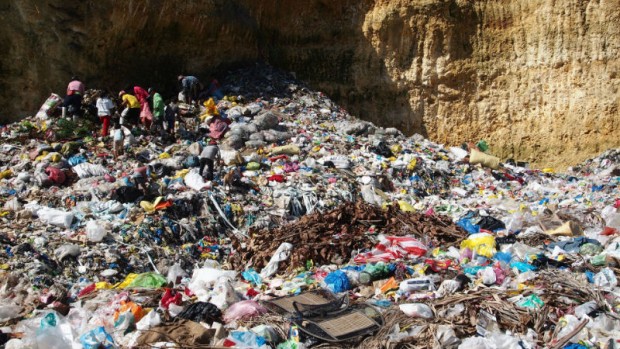No funds, lots of trash in towns facing charges

SCAVENGERS scour the dump for things that they can sell in Compostela town in Cebu province. CHRISTIAN MANINGO/CEBU DAILY NEWS
ILOILO CITY—Lack of funds, high cost of land and the huge volume of garbage are among the reasons local governments in the Visayas cite for allowing dumps in their jurisdictions in violation of the Ecological Solid Waste Management Act, or Republic Act No. 9003.
The local governments are facing environmental charges in the Office of the Ombudsman for failing to construct sanitary landfills.
“We want to put up a sanitary landfill. But we are overwhelmed by the volume of garbage and the cost [of the facility]. We are seeking help from the provincial and national governments,” said Mayor Juancho Alvarez of Ajuy town in Iloilo province.
Ajuy has a materials recovery facility (MRF) in the town center catering to five of the town’s 34 barangays. But Alvarez said the facility could not cope with the increasing volume of garbage, which reaches more than a truckload every day.
“We are eyeing a site for a controlled dump or sanitary facility, but we also need technical assistance,” he told the Inquirer.
Article continues after this advertisementP20M for landfill
Article continues after this advertisementMayor Joel Quiño of Compostela, Cebu province, said the local government was doing everything it could to dispose of the town’s trash in accordance with RA 9003, but it did not have the estimated P20 million needed to build a landfill.
“If we rate solid waste management in the town, I can say I am not that satisfied. We lack facilities because we lack funds,” Quiño told the Cebu Daily News, a sister publication of the Inquirer in Cebu City.
Ajuy and Compostela are among the 50 local government units (LGUs) being investigated for violations of RA 9003. The law prohibits open dumps and mandates the putting up of sanitary landfills and material recovery or recycling facilities.
About 600 mayors, vice mayors, members of the municipal and city councils, and chief environment officers of local governments across the country face criminal and administrative charges if found liable for violations.
On Feb. 10, the National Solid Waste Management Commission filed the complaints against the officials for failing to comply with solid waste management standards prescribed by the 15-year-old law.
These were not yet full-blown administrative and criminal cases but complaints for strategic fact-finding investigations, according to Deputy Ombudsman for Luzon Gerard Mosquera.
Mosquera said the Ombudsman would gather evidence to determine if there was basis to conduct a full investigation.
In the Visayas, the LGUs being investigated include Compostela and Bogo City in Cebu; Ajuy, Sta. Barbara, Sara, Banate and Concepcion towns in Iloilo; and Nabas town in Aklan.
Quiño said Compostela was earning only P70 million to P80 million a year from local taxes and from its Internal Revenue Allotment share and there was nothing to spare to build a sanitary landfill.
Wilfredo Hinoguin, municipal solid waste management officer, insisted that the local government was not operating an open dump but an MRF that doubled as a “mini-dump” since the town’s dump was shut down last year.
Bogo has begun constructing a sanitary landfill on an 8-hectare lot in Barangay Lapas, but the P8 million allocated for the project was not even half the P20 million needed to build the facility, city administrator Max Suico said.
Suico said the P8 million was used for clearing operations and buying the equipment for garbage collection and compacting. “If we build it by phase, [we can] fund the construction. [But] I don’t think it’s possible to shell out money for the whole thing (all at once),” he said.
Mayor James Solanoy of Nabas said the town could not find a site for a landfill because of the soil quality in prospective sites.
Amend law
Mayor Dennis Superficial of Sta. Barbara said RA 9003 should be amended because its provisions were difficult to implement.
“The cost of land is prohibitive and small LGUs cannot afford to purchase land and operate the landfills,” he said.
Sta. Barbara has a controlled dump and an MRF in a 2.5-hectare lot in Barangay Daga, but the facility could not cope with the volume of garbage reaching three tons every day, Superficial said.
Pyrolysis technology
“Garbage has accumulated because these cannot be processed as soon as they come in and we can only recycle less than a fourth of the total volume,” he said.
He said the town had already approved a plan to adopt pyrolysis technology in waste recycling and treatment.
The technology uses heat and magnets to recycle garbage. It is considered environment-friendly because it does not emit smoke, according to Superficial.
Sta. Barbara plans to enter into a public-private partnership scheme to implement the project.
“This would be faster, cheaper and simpler to operate,” Superficial said.